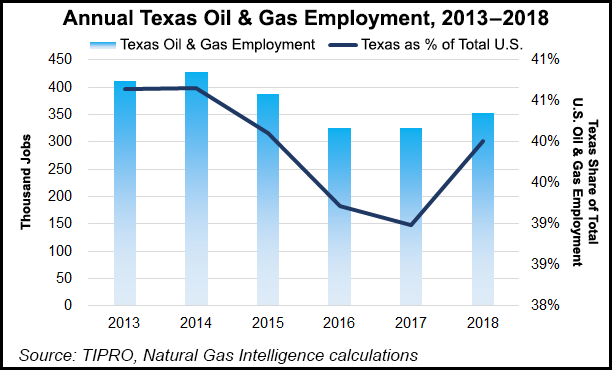E&P | NGI All News Access | NGI The Weekly Gas Market Report
Texas Tops in Natural Gas, Oil Output and Jobs, Says TIPRO
The Lone Star State led the nation last year in oil and gas industry employment with an estimated 352,371 jobs, a gain of 26,700-plus from 2017, according to the annual report by the Texas Independent Producers & Royalty Owners Association (TIPRO).

The industry trade group, which represents more than 3,000 independent producers and royalty owners, said the Texas sector’s employment represented 40% of all oil and gas jobs nationwide in 2018. The job gains last year eclipsed Oklahoma, which added 5,266 people to its rolls, followed by New Mexico (3,626), North Dakota (2,808) and Colorado (2,282).
The fourth edition of TIPRO’s State of Energy Report details national and state trends in oil and natural gas employment, wages and other key economic factors for 2018. The report was developed to further quantify and track the economic impact of domestic production at the state and national level.
The U.S. oil and gas industry employed 880,681 professionals in 2018, an increase of 45,354 year/year, TIPRO’s analysis showed.
“The industry paid a national annual wage averaging $112,712 last year, more than double average private sector wages,” researchers said. “Payroll in the U.S. oil and gas industry totaled $99 billion in 2018, an increase of 6% from the previous year. Additionally, total U.S. goods and services purchased in 2018 by the oil and gas industry exceeded $530 billion.”
Upstream jobs in Texas last year, estimated at 228,553, “were more than four times that of Oklahoma (49,717), and seven times the number of upstream jobs in Louisiana (32,846),” researchers said. “Texas also led the nation in the number of oil and gas businesses (11,757), accounting for 29% of all oil and gas businesses nationwide.”
The state’s oil and gas jobs last year paid annual wages averaging $130,706, 134% more than the average private sector job Texas, according to TIPRO. The total payroll for oil and gas in Texas exceeded $46 billion in 2018, an increase of 9% year/year.
In addition, Texas had eight of the top 25 metropolitan areas for oil and gas employment and 10 of the top 25 metropolitan areas in the country ranked by upstream employment.
On the production side, Texas also led all other states last year in natural gas and oil production.
Total gas output in Texas climbed to 8.8 Tcf from 8 Tcf in 2017. The second largest producer of gas last year was Pennsylvania (6.1 Tcf), followed by Alaska (3.2 Tcf), Louisiana (2.7 Tcf) and Oklahoma (2.3 Tcf).
Oil production in Texas hit a record 1.54 billion bbl in 2018, surpassing a previous record of 1.28 billion bbl set in 1973. The second largest oil producer was North Dakota (443 million bbl), followed by New Mexico (226 million bbl), Oklahoma (187 million bbl), and Alaska (175 million bbl).
“As the national leader in oil and natural gas production, Texas is paving the way for America’s energy independence,” said Gov. Greg Abbott. “From technological advancements resulting in increased oil and natural gas output to our liquefied natural gas export facilities, the Lone Star State’s energy economy is firing on all cylinders.”
Between 2010 and 2018, total taxes and state royalty payments paid in Texas by the oil and gas industry exceeded $100 billion, according to TIPRO data. The funds support “all aspects of the state economy, including schools and education, infrastructure investment, water conservation programs and first responders, to name a few.”
Additionally, Texas is home to around 2.5 million of the total estimated 12.5 million mineral owners in the United States.
“The Texas oil and gas industry has remained a cornerstone of the economy providing high-paying career opportunities, as well as significant taxes and royalty payments made to state, local and federal government entities,” said TIPRO Chairman Eugene Garcia, who also is president of privately owned producer Hurd Enterprises Ltd. “The favorable business environment, environmental stewardship and science based approach to regulatory oversight in Texas is a model for all oil and gas producing states.”
This year, TIPRO’s focus is to advance a “targeted federal policy agenda, while protecting and strengthening an already robust business and regulatory environment in Texas,” President Ed Longanecker said.
“Key priorities for TIPRO at the state level during the 86th Texas Legislative session include increased funding for transportation investment in energy producing areas, workforce development, property tax reform and a balanced approach to critical infrastructure needs that recognizes the dominance of the mineral estate, existing laws and regulations, and private property rights.”
© 2024 Natural Gas Intelligence. All rights reserved.
ISSN © 1532-1231 | ISSN © 2577-9877 | ISSN © 1532-1266 |
